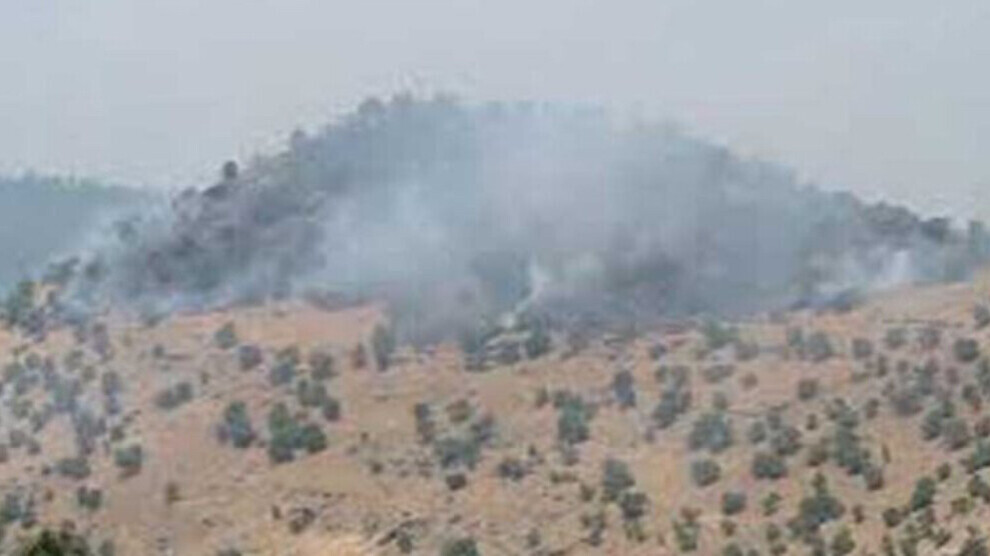Make Rojava Green Again: Politics of the scorched earth continue in whole Kurdistan
An article by Make Rojava Green Again addressed the issue of global warming and its effects on Kurdistan.
An article by Make Rojava Green Again addressed the issue of global warming and its effects on Kurdistan.

Make Rojava Green Again addressed the issue of global warming and its effects on Kurdistan in an article published on its website.
The article reads as follows:
As we witness the process of global warming, forest and field fires have become a danger to society, nature, and our planet as a whole in every part of the world. From the Mediterranean to the Australian coasts, from Siberia to the Amazon, every year thousands of hectares of forest and thousands of animals are helplessly burning, villages are becoming inhabitable and people who try to fight the fires are losing their lives due to lack of resources and means to stop them. The governments, with their unwillingness and ignorance, are responsible for this.
Tragedies like these have become routine due to the destruction of whole ecosystems and the global balance of nature. Still, in Kurdistan, the situation has gone beyond this. The Turkish state is using the burning of forests and the destruction of nature as a tactic of warfare against the people of the region. The Kurds, but also the Arabic and Christian populations in the region of Mesopotamia* are trying to create attempts of local democracies and autonomy, for which the Democratic Autonomous Administration of North-East Syria is only one example. In North Kurdistan (in Turkey) the elections of municipalities have strengthened the civil society once again and also in South Kurdistan and Iraq political parties and inhabitants are not easily accepting Turkish intervention in the area.
All these factors have become severe obstacles in the Turkish state’s expansionist politics which they try to implement in the region. To overcome these obstacles, it is clear that the state decided to continue its politics of the scorched earth.
Already in the 1990s the governments of Turkey were using these genocidal politics against Kurdish guerrilla forces, burning wide areas of forest and villages, especially in the area of Botan, that lies in the border area of Turkey, Syria and Iraq.
These politics are also imposed today by the Turkish government, led by the parties AKP and MHP, but in a significantly wider area and with more subtle methods. On June 21st new attacks of these kinds occurred in the areas between Amed (Diyarbakir) and Merdîn, burning over 5,000 hectares. In these fires 15 people lost their lives, 78 were injured, and hundreds of thousands of living beings were annihilated in the fire. Over 1,000 sheep and goats were burnt to death, 200 were treated for severe burns. Countless plant-life, flowers, local herbs, ants and beehives were burned.
While the Turkish state claimed that these fires were caused by the heat, local sources stated that the fire was caused by defective electrical cables. The Turkish private company DEDAŞ, which has almost the monopoly of electricity as energy supplier in the region, is responsible for service deficiencies such as continuous power cuts, high voltage problems, lack of renewal of electricity infrastructure and neglect of the supervision of these services by the state. The company is known for neglecting reparation works, especially in Kurdish areas. “While the governate said it was a brush fire, the villagers, the first witnesses of the fire, spoke of DEDAŞ’s negligence”. It was also reported, that the state authorities were late to intervene, leaving the villagers alone with extinguishing the fire, which in turn led to multiple deaths. At the same time in the areas around the Turkish-Iraq border forest fires set by the the Turkish army have been reported, as well as deforestation. In Rojava the Turkish state and its mercenaries have been burning hectares of wheat, causing heavy damage for farmers during the harvesting season. To speak in numbers, 1,500 hectares of cultivated land and more than 18 thousand olive trees have been burned in the canton of Manbij alone. Massive damage was also caused both to nature and civilians by the burning of fields by Turkish Military forces in the canton of Cizire.
This way of neglecting and deliberately risking catastrophes like these are classic colonial practices, that set their goals on the destruction of livelihood and emptying out the area demographically, paving the way for the named expansionist politics. The effected mountain areas between Amed and Merdîn play a crucial role for the whole ecosystem between the Euphrates and Tigris rivers.
From the approach of the Turkish state, it can be understood that the destruction of nature is going to continue under the current AKP-MHP government and thousand-year-old ecosystems are being sacrificed for political interests. Not only democratic projects in the region, but survival itself is being threatened.
To avoid the worst, fast action is vital. Ecologists, environmentalists as well as animal-rights activists should recognize that the Turkish state is one of the actors in the region that is the most harmful to ecology and nature.
*Mesopotamia is a historical region of West Asia situated within the Tigris–Euphrates river system, in the northern part of the Fertile Crescent. Today, Mesopotamia is known as present-day Iraq. In the broader sense, the historical region of Mesopotamia also includes parts of present-day Iran, Turkey, Syria and Kuwait.
https://anfenglishmobile.com/ecology/rojava-drip-irrigation-against-desertification-73825